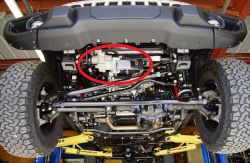
— A Jeep sway bar disconnect lawsuit has been partly dismissed, including dismissal of nationwide class action allegations. The Jeep sway bar lawsuit was filed against Fiat Chrysler, now known as Stellantis, on behalf of owners and lessees of any of these vehicles equipped with electronic sway bar disconnect features.
- 2010-2017 Jeep Wrangler Rubicon (JK)
- 2010-2017 Jeep Wrangler Unlimited Rubicon (JKU)
- 2018-2020 Jeep Wrangler Rubicon (JL)
- 2018-2020 Jeep Wrangler Unlimited Rubicon (JLU)
- 2020 Jeep Gladiator Rubicon
- 2010 Dodge Ram 2500 Power Wagon
- 2011-2020 Ram 2500 Power Wagon
According to the lawsuit, the sway bar is also called an anti-rollbar or a stabilizer bar, but no matter what you call it the purpose of the bar is to provide stability and to prevent the vehicle from leaning to one side when turning.
This means using the sway bar during normal highway driving is a good idea, but disconnecting the sway bar during typical street driving may be dangerous.
However, the vehicles named in the lawsuit are meant for both street driving and off-road driving, so for driving in rough terrain it may be beneficial to disconnect the sway bar.
The vehicles named in the class action include an electronic sway bar disconnect button on the dashboard to allow a driver to disconnect the sway bar when off-roading.
A driver can also reconnect the sway bar with the push of a button, but the plaintiffs allege the sway bar disconnect function is defective, a problem that allegedly causes a serious safety risk to drivers and occupants.
Specifically, the electronic circuit board for the sway bar disconnect is in a housing with allegedly defective seals that are prone to failure, located in an area that is likely to get wet when driving in rain or through water. Water allegedly damages the circuit board and causes the sway bar to disconnect when it should be connected.
The lawsuit was filed by seven plaintiffs who reside in California, Michigan, New Jersey, New York and Texas.
Chrysler Files Motion to Dismiss the Sway Bar Disconnect Lawsuit
Although Judge Sean F. Cox didn't dismiss the entire lawsuit, the judge ruled the plaintiffs lack standing to bring claims on behalf of a nationwide class of vehicle owners, therefore nationwide class action allegations are dismissed.
According to the judge, the plaintiffs failed to plead viable warranty and unjust enrichment claims under the laws of each of the 50 states.
The judge also dismissed express warranty claims after the plaintiffs argued Chrysler violated statements the plaintiffs allege they saw in advertising and marketing materials regarding the vehicles.
The automaker argued the express warranties have express limitations because warranty booklets provided to the plaintiffs, "expressly state that the warranties made in the booklets are the only express warranties that Defendant makes for the vehicle."
Statements made in advertising, owner's manuals and other materials are not covered by express warranties provided with the vehicles.
In its motion to dismiss, Chrysler further told the judge the plaintiffs pleaded a design defect concerning the sway bars, but design defects are not covered by express warranties. The judge agreed and found the Jeep sway bar disconnect allegations in the lawsuit clearly refer to "design" problems.
"While the FAC [first amended complaint] makes references to defects in materials and workmanship, this Court fails to see any well-pleaded supporting factual allegations that would support a claim of defects in materials or workmanship. Thus, the Court shall dismiss the express warranty count on this basis." — Judge Cox
The plaintiffs had better success with implied warranty claims after the judge said at this stage of the lawsuit, he must accept the allegations as true.
Chrysler had argued implied warranty claims failed because the plaintiffs allege the vehicles were "unmerchantable" when in fact the vehicles were fit for ordinary use. The automaker told the judge a breach of implied warranty occurs "only when a defect renders the vehicle unfit for its ordinary purposes of providing transportation to its owner."
However, the judge disagreed with Chrysler:
"Accepting Plaintiffs’ allegations in the FAC [first amended complaint] as true, they plausibly allege that their vehicles are not fit for the ordinary purpose of providing safe and reliable transportation on public roads and are not suitable for the purpose of off-roading due to the Sway Bar Defect and their inability to withstand water."
Chrysler had better success with a fraudulent omission claim where the plaintiffs say the automaker knew about alleged sway bar defects before the vehicles were sold.
The judge ruled in favor of the automaker by referencing a Sixth Circuit ruling:
A “complaint must contain specific facts showing the manufacturer’s knowledge of the defect that it allegedly fraudulently concealed. Mere assertions that a manufacturer’s routine testing, along with customer feedback and increased warranty claims, should have alerted it to a dangerous defect are not enough to meet the 12(b)(6) pleading standard.”
Multiple state unjust enrichment claims were also dismissed, but Judge Cox said the lawsuit can continue based on certain warranty claims.
The Jeep sway bar disconnect lawsuit was filed in the U.S. District Court for the Eastern District of Michigan: Flores, et al., v. FCA US LLC.
The plaintiffs are represented by Bursor & Fisher, P.A., and Barbat, Mansour, Suciu & Tomina, PLLC.




